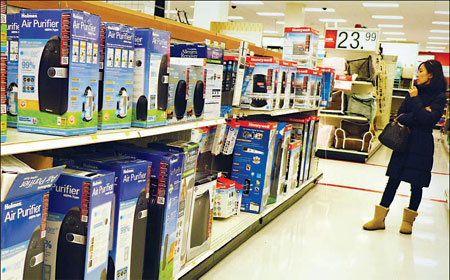Gifts from the US now include products to fight smog in China
|
A customer checks out the air purifiers sold at a Target store in New York City. Zhang Yang / for China Daily |
Luxury goods, health products and milk powder are among the top gifts Chinese take home from the US for friends or family. Now, with smog plaguing a large part of the world's most populated country, especially in Beijing and Shanghai, air purifiers and masks may soon find a place on that list.
"I have already bought 15 masks and plan to buy an air purifier to bring back to my family the end of this month," said Bing, a Chinese PhD student in mechanic engineering who preferred not to reveal her full name. She will travel back to her hometown of Shijiazhuang, in Hebei province, close to Beijing, one of the most severely affected cities by smog.
"I read the news reports about the smoggy weather lately, and it occurred to me that maybe I should bring back an air purifier since the quality of the products in the US are generally more trusted," she added. "I asked my parents if the situation was bad and if they would need one. They think it's a great idea."
As for masks, Bing said some of her Chinese friends here were buying them together online and they asked her if she wanted some to take back to China. "I said, 'Of course'," Bing added.
Allen Tang, sales manager at E-World Travels and Tours Inc, said that in recent months travelers from China have asked him where they could buy masks, in addition to health products and luxury goods.
"Many would express how the air conditioning here in New York is so much better (than the place where they live), and some would even buy dozens of masks to bring back to China," said Tang. "They prefer American brands such as 3M."
"It is interesting that mainland customers prefer local brands like 3M," said Mui, who works at a pharmacy in Chinatown and would give only her last name. "We actually imported these 3M masks from China."
The air pollution is also increasing the demand in China for products to fight it. The market for air purifiers in China is expected to grow at the compounded annual growth rate of around 34 percent in the next five years, according to a report published by TechSci Research in July.
The pollution problem is causing companies outside of China to send in their products. Oransi, an Austin, Texas-based manufacturer of air purifiers, decided to join the flow this fall. CEO and founder Peter Mann announced on his blog that the company's first products were on the way to China. The company insists on highlighting that their products are "Made in USA" to gain consumers' trust.
Blueair, a Swedish manufacturer from which the US Embassy ordered a couple thousand air purifiers for its employees in China last month, said it has seen huge sales recently.
"We can see large increases in order inquiries during specific 'air pollution episodes', both during Q1-Q2 Beijing 'airpocalypse' and more recently as reports have come in regarding the Shanghai situation has also caused a stir in the US," Herman Pihltrd, president of Blueair, told China Daily.
While the price difference in China and the US for masks may not be significant, it is for air purifiers. The cheapest model Blueair 203, retails at 3,590 yuan ($591) from Torana Clean Air, Blueair's official seller in Beijing. The same machine, sells for $329, or 44 percent less, on Best Buy and Amazon websites in the US.
The order of air purifiers for the US Embassy was handled by the Swedish company's American supplier and the unit price was not revealed.
The air pollution and demand for clean-air products has also spurred an arbitrage opportunity, with the purchase of air purifiers from the US and their resale in China.
To show it is less expensive to buy from US suppliers, some of them have been posting the price differences for various product models in both countries.
However, there are problems in ordering from the US, including customs charges, the validity of warranties and voltage differences. An air purifier sent from the US to China has a combined tax rate of 25 percent at customs, according to dutycalculator.com.
"Problems are likely," said Pihltrd. "All countries have different product specifications, and they are made for the conditions of this specific market, therefore a warranty is void if used in another country."

























